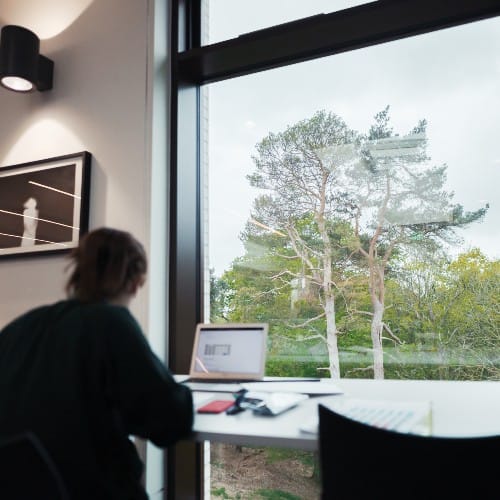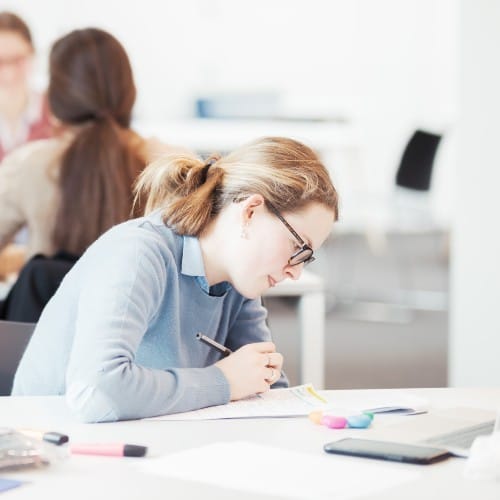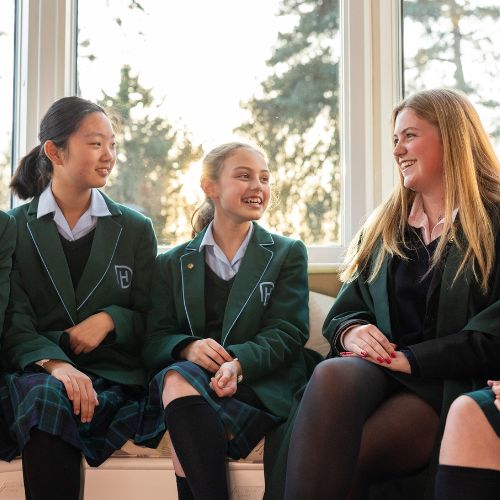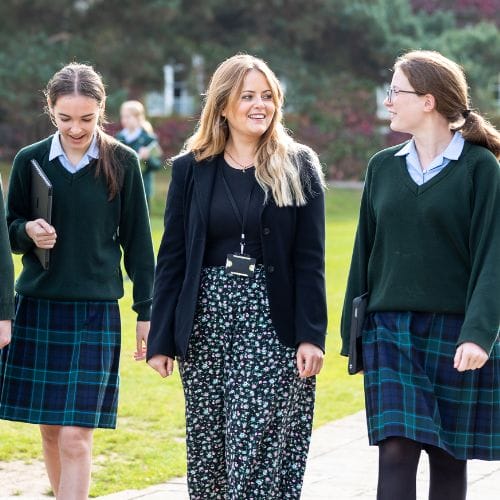
The pandemic means that our current Upper Fifth (UV) and Upper Sixth (UVI) girls will be the first pupils in two years to sit conventional GCSE and A Level exams in the summer. So, ahead of the Easter holidays, I gathered some pupils whose teachers had told me were smart and effective workers – and I grilled them on their revision strategies with a view to sharing them in this blog. This is what they told me: and while different techniques work for different pupils, there should be something for everyone here. There’s even a couple of tips for parents…
You all do lots of subjects at GCSE: what’s the best way to manage the workload?
Jocelyn (UV): “I am doing 11 GCSEs, so there’s a lot to learn! Some subjects are more time consuming than others – like Textiles. I condense each topic for each subject into bullet points on a sheet or card. For example, I create a flashcard for each case study in Geography. Compressing the information in this way makes it easier to learn.”
Queena (UVI): “I spent a great deal of time completing practice papers for GCSE. It was effective but now, at A Level, I find it more valuable to read around my subjects – it’s more interesting, and I learn more that way, too.”
Juliette (UV): “I must prioritise and decide which subjects I need to spend most time on. Some subjects are more content heavy than others.”
What strategies do you use for memorising information?
Zara (UV): “I find testing myself on a mini-whiteboard very helpful. I learn and then write out a Latin passage or my English quotes on a whiteboard – then I check, correct and wipe it clean – and then repeat until I feel confident I know it all.”
ALL pupils: Quizlet is a highly effective way to learn language vocabulary. “I created a 500-word Quizlet for my Latin vocabulary” (Zara, UV).
Tilly (UVI): “As part of my A Level revision, I like to do a past paper for each topic: it helps me to remember and reinforce my learning. I also use a whiteboard to help memorise important information. I’m a fan of mind maps – they can be a really good way to organise your thoughts and give you a kind of ‘picture’ to remember. It’s a good idea to break each subject down into smaller, more manageable topic areas.”
Queena (UVI): “I learn through speaking. I write detailed notes and then I read them to myself – aloud – even if other people think I’m crazy! Sometimes I record myself and listen to myself repeatedly until the information sinks in.”



How do you maintain discipline over the holidays?
Tilly (UVI): “Everyone is motivated in different ways. Ultimately, you must make the decision to work yourself: once you do this, you will make time to study effectively. I aim for five hours of work a day – with some days off.”
Zara (UV): “I turn a timer on when I work – simply so I can see how long I’ve worked for. I find it satisfying at the end of a revision session and can see that I have been working for a long time.”
Queena (UVI): “I don’t like to work within time limits: I am more list orientated. I like to write down a list of goals for the day as it’s really satisfying ticking them off.”
Alice (UV): “I tried using lists but I wasn’t very good at estimating how long each task would take – and it can be quite demoralising if it takes a long time to work though a list. So, I prefer to set myself a time limit for revision during the holidays – it’s four to five hours each day.”
Are there any on-line tools that can be helpful with revision?
Alice (UV): “The Forest app is a very useful tool for keeping focused. You can set the time that you want to remain focused – say, 30 minutes – and during this period a ‘digital’ tree will begin to grow on your phone’s screen. But if you touch your phone, the tree dies! You gain points each time a tree grows fully, and then you can trade these points in to plant a tree in the real world – so, an app with a green conscience! Another app, Pomodoro, is simple but effective: set a timer for 25 minutes, work until it runs out, then take a five-minute break – and repeat the process three more times. After that, take a 15- to 30-minute break. That’s one full Pomodoro cycle. Despite how basic it sounds, the Pomodoro technique is incredibly effective.”
Can parents or families be any help with revision?
Zara (UV): “I think pressure from parents is counterproductive. Personally, I feel guilty if I don’t work sufficiently hard – so I guess it’s a built-in motivation.”
Juliette (UV): “My elder brother was very lazy and so I benefited from witnessing him and realising I didn’t want to make the same mistake!”
Tilly (UVI): “I think Downe House is good at making you take responsibility for your own learning. I wasn’t great up to GCSE but I have become better at this during A Levels.”
Queena (UVI): “The scientist Richard Feynman said that the best way to learn something is to teach it. I agree. So, if I really want to understand a topic, I can choose a friend or relative and try to explain it to them. It’s an effective way to learn something yourself and it forces you to really understand what you are talking about.”
Juliette (UV): “I find the CGP revision books very helpful and clear (especially the Maths and Science ones): so, get your parents to buy them!”
Does it make a difference where you study?
Queena (UVI): “Personally I like to work in my room: everything is familiar and convenient. But I do also like working in the Murray Centre – it can be refreshing to have a change and the atmosphere is conducive to study. I sometimes stay there for five hours at a time at the weekend.”
Tilly (UVI): “I love the Murray Centre – particularly on Sundays. I like to go there and find my own space, and I can take my time.”
Zara (UV): “I know some students find it helpful to work in one of the organised study sessions during the evenings (6.30pm-7.30pm and then 7.30pm-8.30pm). It can just be helpful to be in a room of other people who are focused on their learning.”
My thanks to our revision experts quoted in this article, and I hope some of their tips are useful to other pupils out there. Happy revising!

Mr Matt Godfrey
godfreym@downehouse.net












